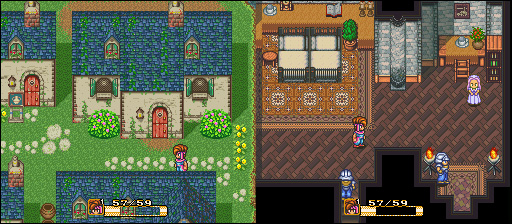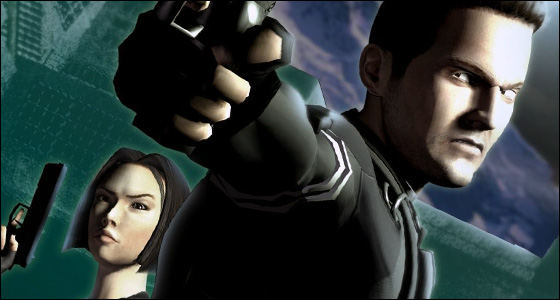It’s a Steep Price to Be Trendy
February 11th, 2009
The other day I went on a mini-spending sphere on the Wii Virtual Console and Playstation Store, the second time that I’ve done so. My stroll through downloadable content land brought with it two unnecessary grievances that really shouldn’t have to burden me. I guess the new-gen kids would call them commodities, I’m not so sure.
Classic Controller Requirement
The first time I went to the Wii Shop was to buy a trio of 16-bit titles, some of which were keen to inform me on start up that I’d need a Classic Controller to play. “I don’t remember the Wii Shop stating anything about this being mandatory” I thought to myself. Fortunately within a few minutes of trialling the games with the Wiimote and Gamecube pad I realized that this announcement was nothing more than an amusing serving suggestion.

The second time around, I realized that I was disappointingly wrong when the copy of Secret of Mana I’d bought for my brother would not operate with the Gamecube pad or Wiimote. What I don’t understand is why didn’t they just map the game to the Gamecube pad, there are enough buttons on the Gamecube controller to accommodate a SNES game. Instead I’m locked out of playing a game I just bought and have to buy another controller.
Daylight Robbery Shrinkrayed
Although I’m about to beat up on it, I honestly have no issues with downloadable expansion packs and other extras, providing they offer reasonable value and incentive to the player. Some of the downloadable content on offer is terribly stingy and it’s almost questionable where DLC is heading too.
What is worse is when there are multiple expansion packs, including bundles of various packs. Sometimes I just want to buy the game and not have to worry about these formalities, particularly when they are on a micro level like this. Case in point with Super Stardust HD. The game has two main expansions; Solo add-on pack and Team Pack. Within the Super Stardust HD category the single game and two expansions are listed, as well as a Double Pack and Complete Pack. From the text descriptions it’s difficult to fathom what exactly each of these packs contain. The Double Pack assumingly has the two expansions at a cheaper price but what about the Complete Pack? The description is ambiguous as to what is included, the prices (in relation to content) aren’t particularly clear either and after Googling and cross checking the official Playstation site for 10 minutes I still couldn’t yield any answers. So I just ended up buying something else.
Microtransactions: In-game iPods and Vagrant Story PSP
February 9th, 2009

Something that I’ve discovered over my time writing about games is that sometimes I think of some really neat ideas that unfortunately don’t hold enough weight to substantiate a single article. I quite lazily just let these ideas slip in favour of something a bit more fully fledged. On the other hand, when it comes to some bigger ideas I’ve perhaps written too extensively about them (*dodges tomatoes while writing another Metal Gear article*). So in order to strike a balance, I figured that maybe I could package these smaller ideas into a single, re-occurring post, add a 95 cent price tag and hence I called it Micro-Transactions. You’ll get the gist.
More iPod in Games
Metal Gear Solid 4 – oh wait, I thought I wasn’t going to do that – introduced the idea of equipping and listening to an in-game iPod while playing. It’s a neat little idea that has many benefits like the pre-installed and later downloadable podcasts offered by the development team, which is similar to optional voice commentary for DVDs. Littering music tracks around the levels also provides an interesting alternative to rewarding players for exploration.
I wonder when we’ll see this idea more widely adopted. I personally loved the idea of scouting out songs to play on the go. If such a service was available through the console interface itself (and activated within game), then this would be an excellent platform for bridging the original soundtrack, director commentary and your own music collection stored on the internal hard drive. I have a PS3, so I think that the interface on pressing the PS button could serve well to accommodate such a feature. Furthermore, what about games which offered free music tracks as rewards. I mean some of us complain about how game music should be free to take, because we own the game. Why not just include DRM-free MP3s as unlockables within the game, providing the option to download them to disc.
The developer podcasts could act as free downloadable content (incentives for both developers who get to voice their feelings and publishers whose game receives added attention for the new content). Then there could be sponsored advertising channels/radio stations/regulated news casts. So many interesting possibilities.
Vagrant Story PSP
It honestly frustrates me to think of all this talk of the PSP being on its way out. Just like the excuses that the PSP was a flop, this holds no weight (case in point, Sony have dug 30 million plus consoles into a previously Nintendo only market). The console has plenty of life left in it and while it is true; the past few months have been notably quiet, the PSP seems to be getting another shot in the arm this year, thanks largely to Square Enix.
Much like they did with the DS, S-E are saturating the console with a series of exclusives and ports with games like Final Fantasy Dissidia, Third Birthday, Kingdom Hearts: Birth by Sleep and Star Ocean: Second Evolution. Many of their other PSP titles have included updated ports like Final Fantasy I + II, Valkyrie Profile: Lenneth and Final Fantasy Tactics: War of the Lions.
With all this said, it would be great if S-E ported over their other PSone game set in Ivalice – the first being FF Tactics – Vagrant Story. Unlike the other few ports, Vagrant Story is much more technological intensive game and would only require a few small alterations to retrofit it to the PSP’s widescreen technology. Also the (needlessly) complex item crafting system could be made easier with online trading of items. Again, just pondering.
The In-Game Mini-Blog
February 7th, 2009
Note that in my recent write up on Trilby I mentioned:
“Preluding each heist is a narrative scene featuring a block of scrolling text in which Trilby prescribes his thoughts of the events layed before him. The text is sort of like a mini-blog that allows the player to get a feel for current Trilby’s woes and worries. This brief insight is interesting not only because it acts as a free ride for Croshaw to display his fine writing skills but also to build understanding between Trilby’s character and the player.”
I actually wrote that article some months ago and hadn’t really thought about this topic much since then. This past week though I’ve been playing through Syphon Filter: Dark Mirror on the PSP where something within the pre-gameplay mini-blog stuck out and made me reconsider its purpose.
When it comes to narrative the Syphon Filter series (there was a trilogy on the PSone, a PS2 title and two recent PSP installments) has never really been more than the equivalent of a B-grade Steven Segal action flick. Personally, I love Mr Segal’s direct-to-video stuff which is perhaps why I am so fond of this series, but then the mini-blog stepped in and elevated Dark Mirror’s story during the later half of the game. While not a huge narrative crutch it was definitely something that I didn’t see coming.

In previous games the pre-gameplay mini-blog (referred to as Mission Briefings) usually contain an outline of the next level from the perspective of the protagonist. Basically they were used as a guise to tutor you on what to expect once the disc loads. In the case of the later half of Dark Mirror, the “Mission Briefings” started to become more of a personal reflection of what the protagonist (that’d be Gabe Logan) was going through. Gabe started to express true feelings about a former lover during the game. While a good deal of this was presented in cutscene format, the more interesting parts were delivered though the briefings text. Over several of the final missions you could begin to see Gabe’s feelings slowly manifested into self doubt and frustration. Gabe’s team mate Lian Xing – who is also playable – interludes Gabe’s conflictions when she becomes playable in her own mission. In her “briefing” she worries over the affects this is having on Gabe and why despite the fact they have been field partners for so long, Gabe never displays an interest towards her.
The emotional context provided in the briefings go on to justify the events that unfold later in the game and since we are slowly drawn into Logan’s mindset his actions seem genuinely believable. In contrast to the usual cardboard gruff that we are use to, this is a significant improvement.
The difference between these sequences in the first and second half of the game is that they are briefings and blogs respectively. The later entries read out as one would imagine the personal blog of these agents read like.
So between the parts that I could see coming, this pinch in the storytelling was effective. I don’t think that it can be billed as anything new, as it’s almost certainly been done before but I think it was worth mentioning before I continue to evaluate the strengths of this title. Beyond Syphon Filter and Trilby I can’t think of anymore examples, but they’ll come in due time.



 Game Design Companion: A Critical Analysis of Wario Land 4 - $7.99
Game Design Companion: A Critical Analysis of Wario Land 4 - $7.99 Level Design: Processes and Experiences
Level Design: Processes and Experiences Speed Boost: The Hidden Secrets Behind Arcade Racing Design - $5.99
Speed Boost: The Hidden Secrets Behind Arcade Racing Design - $5.99 Adventures in Games Analysis: Volume I - $5.99
Adventures in Games Analysis: Volume I - $5.99







